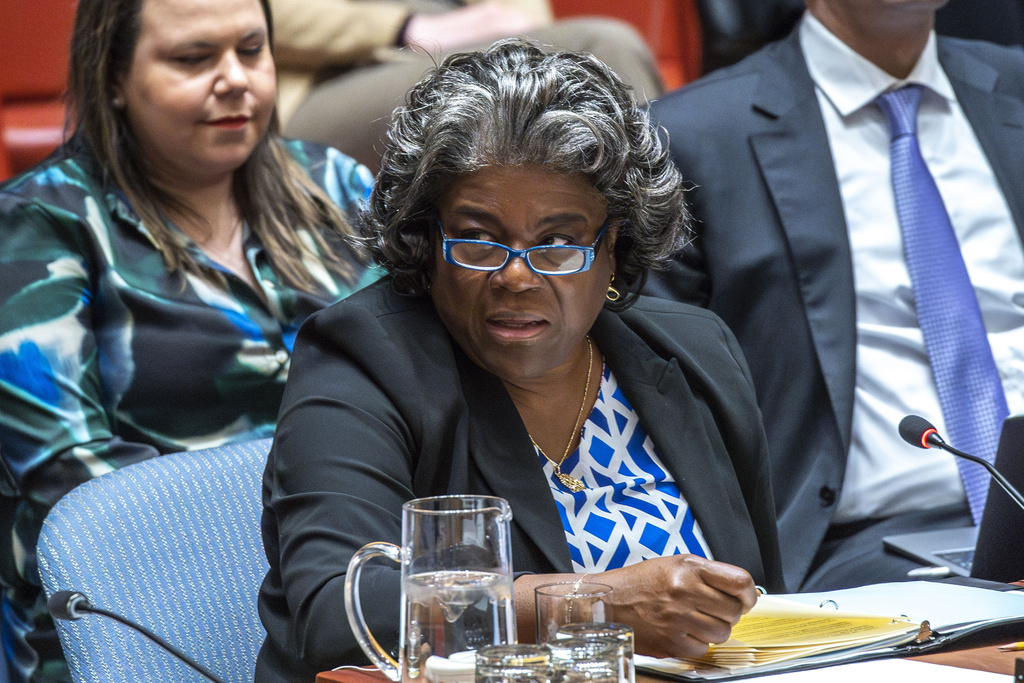The United Nations Security Council is set to vote on a United States-sponsored resolution declaring that “an immediate and sustained cease-fire” in the Israel-Hamas war in Gaza is “imperative” to protect civilians and enable humanitarian aid to be delivered to more than 2 million Palestinians.
U.S. Ambassador Linda Thomas-Greenfield said she was optimistic that the new, tougher draft resolution would be approved Friday by the 15-member council.
The draft being put to a vote “determines” — which is a council order — “the imperative of an immediate and sustained cease-fire,” with no direct link to the release of hostages taken during Hamas’ Oct. 7 attack on Israel, which was in the previous draft. But it would unequivocally support diplomatic efforts “to secure such a cease-fire in connection with the release of all remaining hostages.”
Russia’s deputy U.N. ambassador Dmitry Polyansky said Moscow will not be satisfied “with anything that doesn’t call for an immediate cease-fire,” saying it’s what U.S. Secretary of State Antony Blinken is pressing for and what “everybody” wants. He questioned the wording of the draft, asking, “What’s an imperative? I have an imperative to give you $100, but … it’s only an imperative, not $100.”
“So, somebody’s fooling around, I think, (with the) international community,” the Russian envoy said.
The Security Council had already adopted two resolutions on the worsening humanitarian situation in Gaza, but none calling for a cease-fire.
Russia and China vetoed a U.S.-sponsored resolution in late October calling for pauses in the fighting to deliver aid, protection of civilians, and a halt to arming Hamas. They said it didn’t reflect global calls for a cease-fire.
The U.S., Israel’s closest ally, has vetoed three resolutions demanding a cease-fire, the most recent an Arab-backed measure supported by 13 council members with one abstention on Feb. 20.
A day earlier, the U.S. circulated a rival resolution, which has gone through major changes during negotiations before Friday’s vote. It initially would have supported a temporary cease-fire linked to the release of all hostages, and the previous draft would have supported international efforts for a cease-fire as part of a hostage deal.
The vote will take place as Blinken, America’s top diplomat, is on his sixth urgent mission to the Middle East since the Israel-Hamas war, discussing a deal for a cease-fire and hostage release, as well as post-war scenarios.
Nate Evans, the spokesperson for the U.S. Mission to the United Nations who announced the Friday morning vote, said: “This resolution is an opportunity for the Council to speak with one voice to support the diplomacy happening on the ground and pressure Hamas to accept the deal on the table.”
Meanwhile, the 10 elected members of the Security Council have been drafting their own resolution, which would demand an immediate humanitarian cease-fire for the Muslim holy month of Ramadan that began March 10 to be “respected by all parties leading to a permanent sustainable cease-fire.”
It also demands “the immediate and unconditional release of all hostages ” and emphasizes the urgent need to protect civilians and deliver humanitarian aid throughout the Gaza Strip.
Palestinian terrorists killed some 1,200 people in the surprise Oct. 7 attack into southern Israel that triggered the war, and abducted another 250 people. Hamas is still believed to be holding some 100 people hostage, as well as the remains of 30 others.
The U.S. draft would express “deep concern about the threat of conflict-induced famine and epidemics presently facing the civilian population in Gaza as well as the number of undernourished people, and also that hunger in Gaza has reached catastrophic levels.”
It would emphasize “the urgent need to expand the flow of humanitarian assistance to civilians in the entire Gaza Strip” and lift all barriers to getting aid to civilians “at scale.”
The draft was being put in “blue” Thursday night, which is the final form required for a vote.
After closed council consultations on Gaza late Thursday, France’s U.N. Ambassador Nicolas de Rivière told reporters: “There is a desire to take action, no one want to procrastinate, so we hope that a decision can be made by tomorrow (Friday) evening.”
“There are two options: Either the U.S. text is adopted and then we’ll move to the next phase of this crisis management,” he said, “or the text is not adopted and then the draft of the elected members will come to the table and put to the vote, and I hope it will be adopted.”
For the first time in a U.N. resolution, the U.S. draft would condemn “all acts of terrorism, including the Hamas-led attacks of Oct. 7, 2023, as well as its taking and killing of hostages, murder of civilians, and sexual violence, including rape.”
(AP)












6 Responses
The resolution has been vetoed by Russia and China, it was not in Israel’s favor anyway.
This picture isn’t the UN.
Now, Milhouse if you see different and correct picture it’s because YWN fixed it.
Just like they fixed the picture of the sun solstice and avodah zorah.
Don’t ask me why I’m hocking in chainik.
I saw the old picture and the new one.
You only saw the new one….
Anything not freeing every hostage immediately, isn’t even worth the paper it is written on, and is totally & utterly meaningless.
The aggressor Russia, that has wreaked havoc and murdered hundreds of thousands in Ukraine is championing a call for a complete ceasefire in Gaza. Nice.
Apparently it was understood to requires the Palestinians and their allies to both cease firing and release hostages, so their allies, Russia and China vetoed. Rather than make Biden look like a back-stabber, it made him look clueless about the Middle East.
If a ceasefire is declared, and more “aid” goes into Gaza, does Hamas charge more or less for the aid. Remember that this is sold at 100% profit.
Just wondering whose interest we’re discussing.